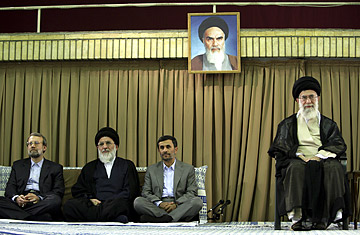
From left: Parliament speaker Ali Larijani, judiciary chief Ayatullah Mahmoud Hashemi Shahroudi, President Mahmoud Ahmadinejad and Supreme Leader Ayatullah Ali Khamenei sit under a portrait of Ayatullah Khomeini during a meeting in Tehran on July 20, 2009
(2 of 2)
The disputed June 12 election was the last straw for Mousavi and those who view themselves as Khomeini's heirs. Their anger turned on a critical point of Islamic doctrine: they insist that the legitimacy of an Islamic ruler springs from the people; Khamenei, on the other hand, believes that legitimacy derives from God's will — and the Supreme Leader's interpretation of that will. In condoning Ahmadinejad's theft of the June 12 election, Khamenei, they believe, has indeed proved himself a usurper.
After Khatami on July 20 demanded that a referendum be held on whether Iranians accept the outcome of the election, Khamenei must have been sorely tempted to order the Revolutionary Guards to round up the opposition, including Khatami. Khatami's speech was a direct swipe at the legitimacy of his rule. Even the opposition was surprised that mild-mannered Khatami dared go this far. The question now, in all the turmoil, is who will be next to come out in favor of a recount.
Iran is locked in a classic power struggle, pitting the house of Khamenei against the house of Khomeini. It has been simmering since Khamenei was appointed Supreme Leader in 1989, but it is only now that Khomeini's heirs have chosen to finally fight back against a complete takeover of the regime by Khamenei and the Revolutionary Guards. The Khomeinists were mistakenly convinced that if they could muster a 70% turnout and win the elections, Khamenei would not dare throw out the results.
Now that Khamenei has refused new elections, the opposition has switched from challenging the June 12 election results to attacking the legitimacy of Khamenei himself. They are counting on Khamenei to continue cracking down on demonstrators, arresting larger numbers of opposition supporters and eventually jailing the leaders. In the end, they believe, Khamenei will so antagonize Qom's ayatullahs that the country's clerical leadership will issue a fatwa condemning Khamenei and the June 12 election. Such a fatwa would strip Khamenei of any legitimacy as Iran's clerical Supreme Leader, eroding his support in the Revolutionary Guards. Already, the enlisted men in the ranks of the Revolutionary Guards are uneasy about suppressing the demonstrations. Its rank and file, like other Iranians, have suffered from the poor economy under Ahmadinejad. Reportedly, there have also been arrests inside the regular army. If true, it's a dark omen for Khamenei. A countercoup may just be on the cards.
It is not a coincidence that Mousavi's backers are on Tehran's rooftops shouting "God is great," evoking the spirit of the 1979 revolution when Iranians spontaneously poured into the streets, the army laid down its weapons and the Shah had no choice but to flee. It's impossible to tell whether Iran has reached this point again. But even if it hasn't, the open war between the house of Khomeini and the house of Khamenei will forever change Iran.
Who ever thought that Ayatullah Khomeini would crawl out of the grave to reclaim his revolution?
Baer, a former Middle East CIA field officer, is TIME.com's intelligence columnist and the author of See No Evil and, most recently, The Devil We Know: Dealing with the New Iranian Superpower. Memarian is an Iranian journalist and blogger who received Human Rights Watch's highest honor in 2005.
